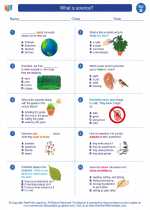Genetic Variation
Genetic variation refers to the differences in DNA sequences among individuals within a population. This variation is the result of mutations, genetic recombination, and other genetic processes, and it is the basis for evolution and the diversity of life on Earth.
Causes of Genetic Variation
Mutations
Mutations are changes in the DNA sequence that can occur randomly or be induced by environmental factors such as radiation or chemicals. These changes can result in new traits and contribute to genetic diversity within a population.
Genetic Recombination
During the process of meiosis, genetic recombination occurs when homologous chromosomes exchange genetic material. This process creates new combinations of alleles and increases genetic variation in offspring.
Gene Flow
Gene flow happens when individuals from one population move to another and interbreed, introducing new alleles into the gene pool and increasing genetic variation within the population.
Natural Selection
Natural selection acts on genetic variation, favoring traits that are better suited to the environment. This process leads to the accumulation of advantageous genetic variations in a population over time.
Importance of Genetic Variation
Genetic variation is crucial for the long-term survival of a species. It provides the raw material for evolution, allowing populations to adapt to changing environments and reducing the risk of extinction due to environmental changes or disease outbreaks.
Study Guide
- What is genetic variation?
- What are the causes of genetic variation?
- How do mutations contribute to genetic variation?
- Explain the process of genetic recombination and its role in genetic variation.
- What is gene flow and how does it impact genetic variation?
- Discuss the role of natural selection in shaping genetic variation.
- Why is genetic variation important for the survival of a species?
[Genetic Variation] Related Worksheets and Study Guides:
.◂Science Worksheets and Study Guides Second Grade. What is science?

 Worksheet/Answer key
Worksheet/Answer key
 Worksheet/Answer key
Worksheet/Answer key
 Worksheet/Answer key
Worksheet/Answer key
 Vocabulary/Answer key
Vocabulary/Answer key
